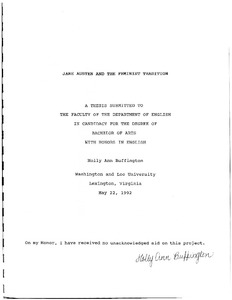| dc.description.abstract | The casual reader of British literature often views Jane Austen as a genteel early nineteenth-century novelist whose works focus on a young woman in her quest for marriage. These same readers would consider as quite improbable, even blasphemous, any suggestion that Austen was a feminist who agreed on a number of issues with seventeenth and eighteenth-century female writers such as Mary Astell and Mary Wollstonecraft. A closer analysis of Austen's novels reveals that, despite popular belief and the self-depreciating "little bit (two inches wide) of ivory" image of her writing that Austen portrayed, she was not a sheltered spinster unaware of events and thoughts outside her close-knit family circle. Jane Austen in fact possessed an appreciation for the feminist tradition of women writers like Astell and Wollstonecraft and incorporated it into her writing. Mary Astell and Mary Wollstonecraft, two radical seventeenth and eighteenth-century feminist writers, respectively, exposed the limiting nature of women's role and education in their contemporary society and adopted the rallying cry, "Women as rational creatures." Similarly, Jane Austen shows an awareness and criticism of the societal expectations of young women and "operates on the assumption that women are inherently as intelligent and rational as men" in her novels. Austen sides with Astell and Wollstonecraft in the eighteenth and nineteenth century debate waged on the role and education of women, but places her own unique seal upon their "feminist" tradition in the so-called woman-centered novel. Each of Austen's witty novels centers around one heroine in her attempts to rise above and often to question early nineteenth-century attitudes and assumptions about women. Austen satirically depicts other women in her novels who are intended to contrast with the heroines while simultaneously ridiculing the courtesy-book and accomplishments notions of correct female education and conduct. She characterizes her heroines, such as Elizabeth Bennet, Emma Woodhouse, and Anne Elliot, as intelligent, often clever young women who are admired by the other characters for their use of reason. The heroines are accomplished in the traditional sense of possessing some knowledge of music, singing, dancing, or drawing, but they generally consider the cultivation of reason a superior pursuit. In addition, Austen's heroines, in word if not in act, refuse to succumb to the conventional view of marriage for money or security. They do not feel that marriage, any marriage, should constitute the ultimate goal of happiness in a young woman's life. Al though Austen admittedly ends each novel with the heroine's marriage, she makes it clear that the young woman has achieved happiness through increased self-knowledge as a result of her experiences in the novel, not solely through securing a man's fortune. An examination of Pride and Prejudice, Emma, and Persuasion and their heroines' respective quests for self-definition and understanding will reveal these subtle traces of Wollstonecraft and Astell-style feminist thought in Austen's novels. | en_US |
| dc.rights | This material is made available for use in research, teaching, and private study, pursuant to U.S. Copyright law. The user assumes full responsibility for any use of the materials, including but not limited to, infringement of copyright and publication rights of reproduced materials. Any materials used should be fully credited with the source. | en_US |
